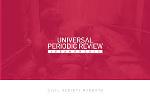Published on Tue, 2015-11-24 05:53
As part of its mandate to develop an indicator framework by which to monitor the goals and targets of the post-2015 development agenda, the Inter-agency and Expert Group on SDGs (IAEG-SDGs) held its second meeting in Bangkok, 26-28 October 2015. The objective was to seek agreement on the proposed indicators for each target—keeping in mind that indicators alone can never be sufficient to fully measure progress on the goals. More specifically, it was to move provisional indicators marked yellow—needing further agreement—to either green—agreed by all parties—or grey—no agreement possible. As a result, there are now 159 green indicators (including 52 moved from yellow and 9 new ones), and 62 greys (including 28 moved from yellow plus 5 new ones). |
Published on Wed, 2015-11-18 20:17
The investor-state dispute settlement mechanisms are incompatible with the Charter of the United Nations and Human Rights, concluded the prominent Cuban-American lawyer Alfred-Maurice de Zayas, in his report to the General Assembly of the UN as Independent Expert on the Promotion of a Democratic and Equitable International Order, appointed by the Human Rights Council. This system, argues the expert, “should be abolished” because it is a “fundamentally flawed system having adverse human rights impacts and because its operation has upset the international order by debilitating States, encroaching on their regulatory space and aggravating inequality and inequity in the world.” |
Published on Mon, 2015-11-16 13:59
During the 23rd Working Group session of the Universal Periodic Review the situation of human rights in Lebanon were reviewed by the UN member states. During the interactive dialogue several member states directed recommendations to Lebanese Delegation headed by Permanent Representative of Lebanon to UN Mission in Geneva Mrs. Najla Riachi Assaker on the issues of women’s rights, torture, migrant workers, establishment of a moratorium on the death penalty. Three and a half hour session provided the occasion for both national delegation representatives and the UN Member states to shed light on the ‘extraordinary challenges’ the country is facing, namely the Syrian crisis and the terrorism in the neighbourhood. Unfortunately as civil society groups engaged in the UPR process and working on issues of human rights and development, we believe that these challenges cannot be ‘excuses’ for non-implementation of recommendations accepted back in 2010 and in overall providing maximum available resources for ensuring the full enjoyment of human rights in the country. |
Published on Wed, 2015-11-11 15:20
After a two days meeting in Bangkok, at the end of October, the statistical experts of the UN agencies have come with a controversial list of 159 “generally agreed” indicators to measure the Sustainable Development Goals approved last September by the UN. Traditionally, development agencies have tried to summarize in a single indicator or index complex development goals. Thus, UNICEF emphasized infant mortality as a proxy indicator of its mandate to protect children, the World Bank has traditionally equated development with per capita income, and UNDP enriched that idea with its Human Development Index based on a larger but still reduced set of indicators. Those single figures were considered to correlate so closely with other relevant indicators (for example infant mortality correlates with child underweight) that they were considered as useful to represent broad trends, progress or regression, in realities that everybody understood as being complex. |
Published on Wed, 2015-11-11 15:00
The arbitrary detention of Hossam Bahgat, (the founder of the Egyptian Initiative for Personal Rights, an independent Egyptian human rights organization and a journalist at Mada Masr, an online news site), on November 9th, 2015 is a mere reflection of the crackdown on civil rights in Egypt and the grim truth about the restricted enjoyment of the ‘’freedom’’ of expression and opinion in the country, that is essentially guaranteed by the Egyptian Constitution Article 651 and Article 19th of the International Covenant on Civil and Political Rights, that Egypt is party to. |
SUSCRIBE TO OUR NEWSLETTER






